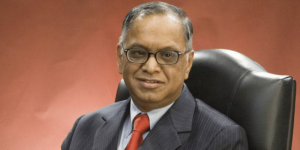“Information, content, course material – there’s plenty of all of this out there, but what students really need is knowledge on how to prepare,” says 26-year-old Nishant Shukla, co-founder of Allahabad-based Geartron Technologies, that runs and owns test prep platform, Examarly.
Examarly is a self-study platform which focuses on outcome-based learning for higher education and test preparation.
Nishant started the company right in the middle of the pandemic along with co-founders Sushant Shukla, Ishan Malviya, and Thribhuvan HL. Being civil services aspirants themselves, brothers Nishant and Sushant understood issues behind UPSC exam preparation.
Through Examarly, the four founders along with ten interns, handhold UPSC aspirants through the entire journey of exam preparation by making personalised plans that help them navigate the vast available content. This saves students 50 percent or more preparation time. “We want to make the platform a ‘Google Map’ for UPSC preparation, where candidates preparing for competitive exams can get real-time navigation for self-study,” says 24-year-old Sushant Shukla.
Examarly is a subscription-based platform that charges a monthly fee of Rs 500, and creates personalised subscription plans according to the needs of students. “Saving time for aspirants is our main goal. Currently, all aspirants giving competitive exams waste so much time every year in making plans and strategies that mostly don’t work out,” says Nishant.
While the brothers and their friend Ishan belong to Allahabad, the CTO Tribhuvan works out of Hassan in Karnataka. About choosing Allahabad as a base, 25-year-old Ishan says that working out of the Tier III town saves massive cash burn. The investments can be channelled judiciously for product, technology, hiring and user acquisition. He does add that challenges remain with regards to infrastructure and lack of access to good talent, as compared to Bengaluru or Delhi NCR
How it started
In 2019, when Nishant was home in Allahabad, preparing for his third attempt in UPSC civil services exam, he got together with his brother Sushant to analyse his previous failed attempts. Sushant, who was also preparing for his exams, was eager to learn from his experience.
Nishant, an IIT-BHU graduate, had managed to breeze through the JEE exam, but failed to crack UPSC exams despite having all the necessary content. Sushant dropped out of college to pursue a career in stocks and crypto, but later completed his graduation through distant learning university IGNOU in order to be eligible for UPSC exams.
Reminiscing about those days, Nishant says that after that first discussion, the brothers sat down to go through various UPSC topper videos, interviews, blogs and other first-person accounts to find gaps in their own preparation. Many days of analysis later, the duo noticed a pattern emerging, which was that it was difficult to identify weak areas as the syllabus is huge. “This was actually a common problem faced by many candidates. They start their preparation without any clue on how to plan the curriculum and track their progress, and this wastes a lot of time as it requires expertise in the syllabus, and 30-40 minutes of effort every day,” says Nishant.
“It was then that Sushant came up with the idea of looking at the syllabus in terms of 100-200 micro topics instead of seven to eight broad subjects, and mapping all these micro topics in an excel sheet and tracking progress,” tells Nishant
Though this made a lot of sense for Nishant, he did not have the time nor the experience to do this effectively, so the brothers left the idea as it is. When Nishant’s third UPSC attempt in 2019 also fell through, he decided to look for some professional help, so he moved to Delhi and started working with a coaching centre in its tech team.
Working for the coaching centre got Nishant thinking about technology, products, and entrepreneurship. He went back to discussing with his brother, and decided to work on the idea of segregating the syllabus into small bits so that a person can self-study. Sushant, who was also facing issues preparing for the exams, instantly agreed. They conceptualised the platform, and roped in their techie friends Ishan and Thribhuvan, who quit their jobs in Delhi and Bengaluru respectively, to launch Allahabad-based Examarly. The platform went live in late 2020.
Market and Competition
The exam preparation space, largely offline at present, is increasingly moving online. Market research firm Technavio says the test preparation market size in India is forecast to grow by $7.14 billion between the time period of 2018 and 2022. According to the HRD Ministry, India has 50 million students in colleges, and around 240 million in junior and primary education. Some of these students will – at some point in time – need to prepare for competitive exams. Edtech companies like Examarly, Unacademy, ixamBee, Prepscholar, Pariksha, BYJU’S, and many more are eyeing this target audience.
On competition, Examarly’s co-founder and CTO, Thribhuvan, 28, says that most edtech startups solve the problem of accessibility, which is only the first phase. “We do see a lot of platforms cropping up who are trying to do things similar to us. Among the more established startups, Embibe is somewhat similar to us,” he adds.
Growth, Funding, and Future
It has only been seven months, but the company has already onboarded over 50 paid users. How did they attract their first customers? Nishant says they initially did a proof of concept by providing Examarly solutions to UPSC aspirant groups on platforms like Telegram. By February this year, the offering took shape of Examarly.
“The most heartening thing has been that all the students following our plans were able to complete the standard books for UPSC two to three times faster just because they focused on one chapter at a time, instead of being put off by 600–700-page books,” claims Nishant.
The founders have put in Rs 20 lakh as seed money so far from their own savings to bootstrap the company. The company is seeking to raise an angel round to scale its offering, and strengthen its positioning in the market. The company also has mentors such as entrepreneur Kush Agarwal, and d.light India MD, Kamal Nath.
“Our focus right now is on enhancing our technology and making our product more robust so that we can design plans that are more personalised and more specific. The target would be to save more than 50 percent of aspirant time including that spent in planning, reading and revision. We are targeting 5000-10,000 paid users by the end of FY22,” signs off Ishan.
As of now, Sushant and Nishant have put their IAS dreams on hold. Nishant concludes that the duo aimed for the IAS as they always aspired to make India better, but now they are just happy that they have a found a way to provide solutions to people with the same goal.

![You are currently viewing [Startup Bharat] How these IAS aspirants from Allahabad launched an exam road map platform for UPSC candidates](https://blog.digitalsevaa.com/wp-content/uploads/2021/05/Nishant1-1620224804469.jpg)








